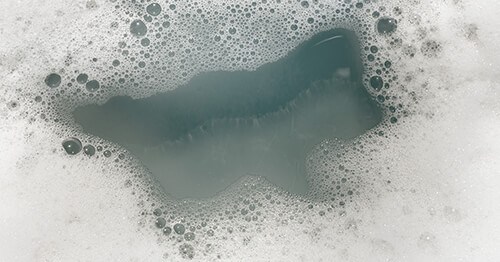Key Factors Behind Effluent in the Bathtub
Key Factors Behind Effluent in the Bathtub
Blog Article
The article author is making a few great observations about Why sewage is coming up through your bathtub overall in the article down below.

Sewer backup in the tub can be an upsetting and unhygienic trouble for any house owner. Not only is it inconvenient, yet it likewise positions major wellness dangers and suggests underlying concerns with the plumbing system. Comprehending why sewer is coming up through the bathtub is important for taking appropriate activity to resolve the issue successfully.
Introduction to the Issue
Typical Factors for Sewer Backup
Clogs in the Sewage System Line
One of one of the most typical causes of sewer backup is a clog in the drain line. This can occur because of the build-up of particles, grease, or international things in the pipes, avoiding proper flow and triggering sewage to support right into your bathtub.
Tree Origin Invasion
Tree roots looking for wetness and nutrients can infiltrate sewer lines through tiny cracks or joints. With time, these roots can expand and expand, triggering significant damages to the pipelines and causing sewage backup concerns.
Understanding the Issue
When sewage draws back up into the tub, it's a clear indicator of an issue with the water drainage system. The wastewater that must be moving away from your home is instead locating its way back into your space, which can cause substantial damage and health hazards.
Possible Causes
A number of aspects can contribute to sewage back-up in the tub. From blockages in the sewer line to issues with the plumbing framework, determining the root cause is crucial for discovering a solution.
Aging Framework
Older homes might have obsoleted plumbing systems that are a lot more prone to rust, fractures, and deterioration. As pipes age, they become more vulnerable to leaks and blockages, raising the possibility of sewer backup occurrences.
Heavy Rainfall or Flooding
During durations of heavy rainfall or flooding, the sewer system may come to be overloaded with excess water, triggering backups and overflows. This can result in sewer supporting right into bath tubs and other fixtures inside the home.
Indicators of Sewage Backup
Foul Odors
Unpleasant odors originating from drains or fixtures, particularly in the restroom, might suggest sewer back-up concerns. These odors are frequently solid and relentless, signaling a problem that calls for instant interest.
Slow Draining Fixtures
Tubs, sinks, and commodes that drain pipes slowly or otherwise at all could be experiencing sewage backup. If multiple components are affected simultaneously, it's most likely that the problem originates from a common factor, such as the main drain line.
Gurgling Noises
Odd gurgling or bubbling sounds coming from drains when water is running elsewhere in the house are a measure of air caught in the plumbing system. This air build-up can result from sewage backup and must be explored without delay.
Health And Wellness Dangers Related To Sewage Back-up
Contamination of Water System
Sewer back-up can contaminate the water in your home, presenting a major wellness threat to you and your family members. Exposure to polluted water can bring about stomach concerns, skin infections, and various other illnesses.
Mold and mildew Development
Moisture from sewer back-up can produce excellent conditions for mold development in your house. Mold spores can intensify respiratory problems and create allergic reactions in delicate people, making punctual cleaning vital.
Spread of Disease
Sewage consists of unsafe microorganisms, infections, and bloodsuckers that can cause a variety of illness, consisting of hepatitis, cholera, and gastroenteritis. Coming into contact with sewage or contaminated surfaces puts you at risk of infection.
Cleaning Up After Sewer Backup
Disinfection Procedures
Completely decontaminate and sterilize influenced areas after sewage back-up to remove dangerous bacteria and avoid mold and mildew growth. Use proper cleansing items and safety equipment to guarantee secure and reliable cleanup.
Reconstruction of Impacted Locations
Fix any type of damages to flooring, wall surfaces, or components caused by sewage back-up. Relying on the extent of the damages, you may need to replace carpets, drywall, or various other materials to recover your home to its pre-loss problem.
Immediate Actions to Take
Switching Off Supply Of Water
In the event of sewage backup, it's essential to switch off the water supply to prevent additional contamination and damage. Find the primary water shutoff valve in your home and shut it off till the concern can be solved.
Contacting an Expert Plumber
Handling sewer back-up is not a DIY task. Call a certified plumber with experience in taking care of sewage-related issues to analyze the scenario and execute necessary repair services or cleanings.
Staying Clear Of Contact with Infected Water
Till the sewer backup is solved, prevent contact with polluted water to prevent the spread of germs and microorganisms. Wear protective equipment if you should remain in the damaged area and wash your hands completely afterward.
Preventive Measures
Normal Maintenance of Sewer Lines
Schedule normal evaluations and upkeep of your sewage system lines to determine and deal with possible issues before they intensify into major issues. This can include cleaning debris, inspecting for tree origin breach, and fixing any kind of broken pipelines.
Setting Up Bayou Valves
Think about mounting bayou valves in your plumbing system to stop sewer from flowing back into your home throughout durations of heavy rainfall or flooding. These shutoffs immediately close when water starts backing up, protecting your home from contamination.
Correct Disposal of Family Waste
Prevent purging anything apart from bathroom tissue and human waste down the bathroom to prevent blockages and obstructions in the drain line. Dispose of oil, oil, and other home chemicals properly to minimize the risk of plumbing troubles.
Why is There Sewage Coming Up Through the Bathtub
Sewage in your bathtub is a major problem that can make you want to abandon the bathroom for good. You don’t have to. However, it is important to identify the source of the issue and take the necessary steps to resolve it in order to avoid any health risks and property damage. In this article, we will discuss what could be causing sewage to back up through your bathtub so you can take action quickly and effectively.
The Main Reason For Sewage Backup in The Bathtub
All the sinks and toilets in your home connect to different pipes that lead to the main sewer line. The sewer line then connects to the municipal sewer system. This connection works seamlessly on a daily basis, but there can sometimes be a problem with the main sewer line.
The most common cause of sewage backup is a clogged or blocked main sewer line. The main sewer line can be clogged due to the accumulation of debris, tree roots or grease buildup, or other materials. Another possible cause is a collapsed pipe. When this happens, your toilets and sinks won’t be able to drain properly. This is when sewage starts backing up through the bathtub. If the problem has been occurring for some time now, it might be time to consult with a plumber as there may be more severe damage that needs fixing.
How Can You Tell if it’s Coming From Your Sewer Line?
If you’re experiencing a sewage backup in your bathtub, then you can use a few simple methods to determine if it is coming from the main sewer line. First, try to unclog the tub drain with a plunger or an auger and see if that helps. If not, then inspect all of the drains in your house and check if there is any blockage in them. If some of the other drains are not working fine, then it’s likely the problem is with your main sewer line.
Common Signs of a Clogged Main Sewer Line
If you suspect that your main sewer line is blocked, then there are a few common signs to look out for. Frequent clogs in your home are a sure sign of a clogged sewer line. You can also check for slow drainage from all the plumbing fixtures.
Slow Drains
If you notice that it takes longer for your sinks and toilets to drain, then this could be a sign of a clogged main sewer line.
Frequent Clogs
Another common sign is that your drains or toilets become clogged almost all of the time. If this happens, then it could be a sign that the main sewer line is blocked.
Water Backup
Do you notice water or sewage coming back up from any of the drains in your home? If your answer is yes, you may have a clogged main sewer line.
Sinkholes
If you’ve noticed sinkholes in your yard or overflowing sewage from the ground, you may be facing a blocked sewer line issue.
Your Shower or Sink Makes Gurgling Noises
Have you noticed gurgling noises coming from your sink or shower lately? These are typically signs of a blocked sewer line and should be checked out immediately.
How to Prevent a Main Sewer Line Clog
Once you’ve identified that your main sewer line is clogged, it’s important to take steps to prevent it from happening again. The best way to do this is to avoid putting any solid material that can clog the drain, such as grease and other debris. You should also be mindful of what you flush down your toilet. In addition, you should schedule regular maintenance for your main sewer line. This will help keep it clear and free from clogs or backups.
What Should You do if You Notice Sewage Backing up Through The Bathtub?
If you’ve noticed sewage backing up through the bathtub, then it is important to call a professional plumber immediately. A plumber can inspect the situation and determine what the cause is, such as a blocked main sewer line. They will also be able to advise you on how best to fix the issue. In some cases, a simple drain cleaning may be all that is needed.
However, if the blockage is severe, then your plumber may need to use more advanced methods to clear the blockage.
No matter what, it is important to always call a professional plumber if you experience any kind of sewage backup. They will be able to assess the situation and provide you with a solution that is best for your home.
https://baylorinc.com/blog/why-is-there-sewage-coming-up-through-the-bathtub/

I'm very enthusiastic about Water Coming up Bathtub Drain and I am praying you enjoyed reading the new piece. For those who appreciated our blog post plz make sure you remember to pass it around. Thanks a lot for being here. Come back soon.
Information
Report this page